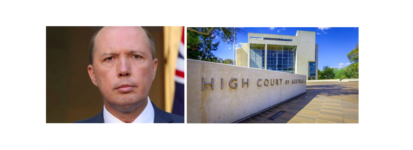High Court Rules that Refugees Can Hold Dutton to Account: An Interview with Lawyer George Newhouse

Home affairs minister Peter Dutton looks likely to be hit by a tsunami of breach of duty of care cases brought by asylum-seeking litigants temporarily in this country to receive medical treatment, after having suffered deplorably in offshore immigration facilities located on the land of poorer nations.
The High Court of Australia ruled on 2 December that the Migration Act does not prohibit refugees and asylum seekers transiting through Australia from suing the federal government for negligence and breach of duty of care in the Federal Court.
The ruling was made in an appeal brought by minister Dutton that involved an attempt to block the case of four asylum-seeking children who’d been held long-term on Nauru. Two of the children were represented by the National Justice Project, while the others were clients of Maurice Blackburn.
The government wanted to ensure that all such breach of duty of care cases brought by transiting persons must be dealt with in the nation’s highest court, which would slow matters down substantially.
But the five justices of the bench made certain that the High Court is not to be treated like a “post box”.
The crux of the matter
As the High Court tells it, each of the children instituted proceedings in the Federal Court whilst still on Nauru, claiming the government had breached its duty of care in not providing adequate medical treatment on the island. They were then transferred here temporarily to receive treatment.
Dutton’s appeal revolved around section 494AB of the Migration Act 1958 (Cth), which lists a number of types of proceedings that transitory persons cannot bring against the federal government whilst they’re in Australia.
Section 494AB underscores that this does not affect the jurisdiction of the High Court as set out under section 75 of the Australian Constitution.
The minister was arguing that these cases fell under the list of barred proceedings, leaving the High Court to hear all such matters. But the justices of the Kiefel Court ruled that section 494AB did not in fact take away the jurisdiction of the lower courts to hear such proceedings.
Children held in offshore prisons
Prior to the successful Kids Off Nauru campaign of late 2018, there were around 100 children held in offshore detention on the island. Dozens had attempted suicide, including kids as young as ten. And around 30 were suffering a rare psychiatric condition known as traumatic withdrawal syndrome.
The National Justice Project has been a formidable force in bringing justice for offshore asylum-seeking detainees over recent years. George Newhouse is the director and principal solicitor of the not-for-profit legal service.
Sydney Criminal Lawyers spoke to Mr Newhouse about the implications of the High Court ruling, the backlog of cases that the decision has cleared the way to move forward and the fact that 5-year-old Kopika and 3-year-old Tharunicaa are spending their third Christmas in immigration detention.

The High Court of Australia ruled on 2 December that the Migration Act does not prohibit refugees and asylum seekers transiting through Australia from suing the federal government for negligence and breach of duty of care in the Federal Court.
The National Justice Project led the argument against the appeal brought by Dutton over breach of care cases against the minister involving transiting people being able to be heard in the Federal Court.
Mr Newhouse, what’s the significance of the outcome?
The minister has argued since October 2018, that the Federal Court has no power to hear these cases: that the court does not have jurisdiction to hear cases from transitory persons.
The High Court has slapped the minister down and made it very clear that lower courts – meaning all courts below the High Court, so state, territory and federal courts – do have the power to hear these cases.
But the minister may use the section of the Migration Act as a defence in certain circumstances.
However, the High Court sent the minister a very clear warning that if he did that when there was no point, he would not be acting as a model litigant, and warned the minister not to waste the court’s time.
I don’t know if you saw the comment about the High Court not being a “post box”?
Yes, I did.
Well, that’s a very clear message. In fact, it is very rare to see comments like that from the court, together with reminders to the government about how to conduct themselves.
Dutton was specifically appealing against the Federal Court hearing a breach of duty of care case on behalf of four asylum-seeking children who’d been held on Nauru.
What sort of circumstances do these cases involve?
These are cases for some extremely vulnerable and sick children and their families.
These children suffer from constant nightmares, they struggle to interact with other children, and they experience suicidal thoughts. Some of them have self-harmed or attempted to take their own lives.
The cases revolve around holding the government accountable for their cruel and inhumane policies, which are damaging people’s lives.
The appeal focused on whether section 494AB of the Migration Act prevented transiting asylum seekers from suing the Australian government in the Federal Court.
What brought the appeal over the line in favour of the National Justice Project’s position?
To understand the answer to that question you need to look at our constitution and the ability of the courts to hold government accountable for breaches of the law.
The most important quote in the decision is:
The High Court has decided that “section 494AB does not limit the jurisdiction of any court” based on the long established principle that “a law of the Commonwealth is not interpreted as withdrawing or limiting a conferral of jurisdiction unless the implication appears clearly and unmistakably”.
That view of the High Court is consistent with another decision called Bodruddaza versus Minister for Immigration and Multicultural Affairs from 2007, where the court read down a different section of the Migration Act, making a pointed observation, “Such a draconian, if not irrational, legislative scheme should not be attributed to the parliament in the absence of clear words.”
The point I’m making is that the High Court jealously guards the ability of courts to hear cases under our constitution and won’t permit the government to remove the jurisdiction of such courts without clear and unmistakable words.
This decision affects the cases of the four asylum-seeking children. But how does it affect other cases? Are there more to come?
Yes. As I understand it, there are around 50 cases which have been stalled in the Federal Court waiting for this decision. They will now move ahead. And we are aware of dozens of other cases in the wings.
This government has treated asylum seekers with contempt and has harmed young children and their families. It is important that they are held accountable for their misdeeds through the courts.
The government was suggesting that these types of cases against the minister should be heard in the High Court rather than the Federal Court. Why would that be preferable for the government?
It is only preferable to the government as they want to make it as difficult as possible for asylum seekers to enforce their rights.
As an aside, the Biloela family – Nadesalingam, Priya, and their two infant daughters Kopika and Tharunicaa – are about to spend their third Xmas in detention, and their second on Christmas Island.
What are your thoughts on their continued detention?
It’s appalling to see children detained to support the political and policy objectives of this government.
It’s obvious that they are doing harm to this family, and the response from the minister is to turn a blind eye to it.
And last one, Mr Newhouse, there are four cases underway, and about 50 more in the pipeline. What does this mean for minister Dutton and the federal government?
Mr Dutton should be worried because these cases will expose the cruelty and inhumanity of government policy, and the way that young children are being damaged under our watch.







